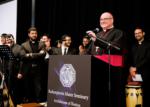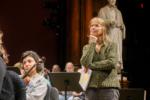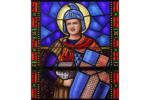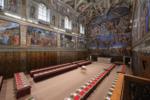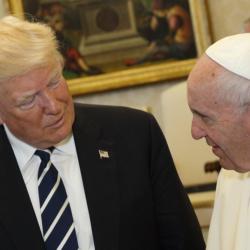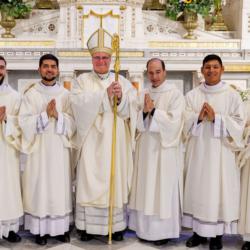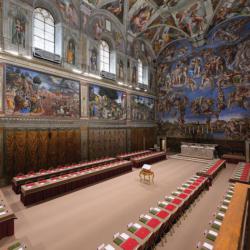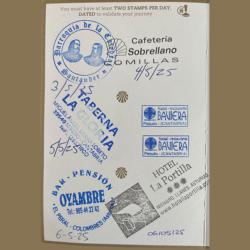Five ordained transitional deacons for Boston
BOSTON -- Five-year-old Deacon Johnathan Saniuk was sitting on the couch watching TV when his priestly vocation was discovered.
The boy just didn't realize it yet. It was his youth minister, Nancy Goggin's mother, whose house young Deacon Saniuk was visiting, who first realized the boy's destiny.
"Mark my words," she told her daughter. "There's something very special about Johnathan."
"Yeah, he's a great kid," Goggin replied.
"No, no, mark my words. He's going to do something really important for the world. I'm not going to be alive to see it, but you mark my words."
"Mom, he's five years old, sitting on the couch, he's having a snack."
"No. You mark my words."
Goggin later recalled, "She was the first to see his vocation."
Goggin herself saw Deacon Saniuk's vocation when he was in middle school, where he'd wear a cross around his neck every day. Goggin asked him why he wore it, and he replied: "Middle school is really tough. I wear it because if kids are having a hard time, they can look at me and see the cross."
Goggin went to Deacon Saniuk's mother and said, "He's gonna be a priest."
Goggin was at the Cathedral of the Holy Cross in Boston on May 3 to see Deacon Saniuk and four other seminarians be ordained transitional deacons in a Mass celebrated by Archbishop Richard G. Henning. Deacon Saniuk, a 27-year-old seminarian at St. John's Seminary in Brighton, was ordained along with Deacons Giris Azize and Stephen L. Baruffi of Pope St. John XXXIII National Seminary in Weston, and Deacons Javier Padilla and Diego Pena of Redemptoris Mater Seminary in Chestnut Hill. The five men will be assigned as deacons in parishes throughout the Archdiocese of Boston for one year, after which time they will be ordained as priests.
The Rite of Ordination began with the candidates being presented to Archbishop Henning and him electing them for ordination. The assembly applauded to show their approval of the candidates being ordained as transitional deacons. The archbishop then explained the responsibilities of the diaconate to the candidates.
In his homily, the archbishop said that when he went to Rome for the funeral of Pope Francis, he heard a great bell in St. Peter's Basilica toll at the beginning and end of the Mass. He was amazed at how the sound of the bell was not only in its striking, but also in its reverberation all over the city. He could feel the vibrations. He compared the bell to the role of deacons. A deacon's preaching is in the striking of the bell, he said, but its vibrations are the moments when a deacon lives the Gospel.
"Our hope, that of the whole church in Boston, which rejoices with you today, is that your voice, your life, will sound out over this city and its surrounding areas," the archbishop said. "That you will give glory to God, and that that glory will be reflected in all that you say and do. People will feel it in their heart when they see you and hear you. Be like that great bell tolling to call the people to prayer, reminding them that God is with them, speaking to their hearts."
He said that deacons offer themselves to the Lord, which is why chastity and celibacy are required of them.
"The promise you make is not a matter of your feelings only," he said. "It is not a merely spiritual reality. It is a concrete, physical reality. You are saying to God and the church, 'I give myself. I make of myself that offering for the glory of God and the service of his holy people.'"
He said that by giving themselves to God, the candidates have given "a precious gift."
"Thank you for that faithful response to the call of the Lord. Thanks be to God for having called you and given you to us, and God bless you and your ministry this day and everforth," he said.
After the homily, the candidates pledged obedience to Archbishop Henning and his successors. They then lay prostrate on the floor before the altar, representing their humility before God. The assembly prayed the Litany of Supplication for them.
After the Litany of Supplication, the bishop laid his hands on each candidate's head and prayed the words of consecration, continuing the tradition of the church going back to the time of the Apostles. With the laying of hands and the prayer of consecration, the candidates were officially made deacons.
The new deacons were then vested in the stole and dalmatic and received Books of the Gospels from the archbishop. They then exchanged the Kiss of Peace from the archbishop and deacons in attendance.
After Mass, Archbishop Henning thanked God, the rectors of the Archdiocese of Boston's three seminaries, and his fellow bishops, priests, and deacons.
"Many thanks to the seminarians who are here as well," he said. "I hope that you see your brothers here as a sign of hope and encourage you in your own journey."
He thanked everyone who accompanied the priests in their formation.
"Deacons and priests do not come from the clouds," he said. "They come from families and from communities. So I'm very grateful to the families and communities of these newly ordained deacons."
"Incredible," Deacon Saniuk said after Mass. "The grace is incredible. I can't begin to describe it. Just the weight of all those prayers hit me like a truck, a waterfall, a torrent of grace just poured into my soul. I'm so grateful, grateful for your presence, grateful for the presence of everybody here today. It's one of the greatest gifts I've been given in my life."
As a young man in Milford, Deacon Saniuk would spend lots of time in Eucharistic adoration.
"It was a tough journey for me," he said.
He struggled with his faith and considered becoming Protestant, but the real presence of Christ in the Eucharist encouraged him to remain in the church.
"It was seeing him in all his glory, being processed around, where I first really felt the call, the call to come to seminary, to become a priest," he said.
He was in the seminary for two years when he realized, "Alright, I can do this, and God has given me the grace."
Deacon Azize said that his prostration before the altar was like being in Heaven.
"It's a glorious day, wonderful," he said.
Deacon Azize, 66, grew up in a Maronite family in Puerto Rico. He felt called to the priesthood from an early age but ignored it until he couldn't any longer. He went on a pilgrimage to Fatima, where he felt "a strong call." As a transitional deacon, he said he wants to "love God and share my love for his people."


